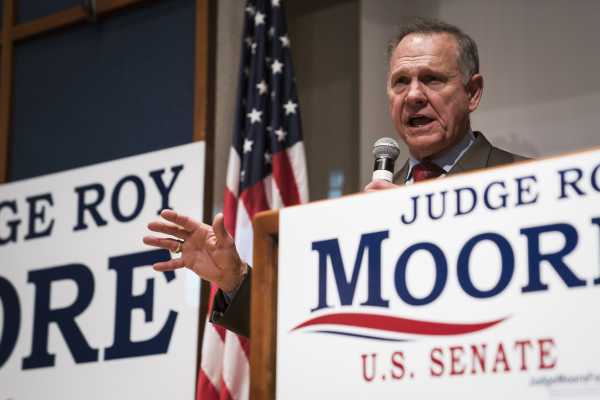
Roy Moore, whose 2017 Alabama Senate campaign imploded amid allegations of sexual assault, resulting in the first Democratic victory in an Alabama Senate race since the early 1990s, has announced that he is running for the Senate, again.
In an event held in Montgomery, Alabama, on Thursday, Moore told a crowd of reporters, “Yes, I will run for the United States Senate in 2020,” adding, “Can I win? Yes, I can win.”
Moore’s decision is likely to be greeted with despair from Republicans (and perhaps some optimism from Democrats). Even many conservatives who supported Moore’s 2017 campaign initially now believe that the former chief justice of the state Supreme Court could act as a millstone on Senate Republicans and their hopes to retain control of that body of Congress in 2020.
Alabama is as red as they come — the state’s partisan lean, a metric of how much more Republican (or Democratic) a state is than the country as a whole, is R+27. And Alabama Republicans believe they have a stable of candidates who each could defeat Democratic Sen. Doug Jones. But Moore is still popular with some Alabama conservatives, and some in the GOP relieved by his 2017 loss could have real regret over the risk of losing another easy-to-win Senate seat.
In an interview with Politico in late May, Steven Law, president of Senate Leadership Fund, said, “We believe most Alabama Republicans realize that nominating Roy Moore would be gift wrapping this Senate seat for Chuck Schumer.”
Roy Moore, (briefly) explained
Before Moore ran for Senate in a 2017 special election, he was best known nationally for his repeated efforts to bypass federal court rulings (and his deep contempt for gay people), resulting in his removal from his post as chief justice of the Alabama Supreme Court in 2003 — a post to which he was reelected several years later (before resigning amid controversy).
As my colleagues Andrew Prokop and Jen Kirby explained in late 2017:
In September 2017, Moore’s popularity with conservative Alabamians helped him beat his Republican primary opponent, Luther Strange, who had Trump and Senate Majority Leader Mitch McConnell’s backing. (The special election was triggered by Sen. Jeff Sessions’s confirmation to the role of attorney general.) And his campaign in the general election, with help from former White House chief strategist Steve Bannon, relied on culture war touchstones, as I wrote in December 2017:
But while he received significant support from congressional Republicans (and Trump) after his surprise primary victory, that support fell apart when in November, allegations surfaced that Moore had sexually pursued teenage girls while in his 30s.
As the Washington Post first reported on November 9, four women accused Moore of making sexual or romantic advances toward them when they were teens (as young as 14) and he was in his 30s.
From Prokop and Kirby:
Trump, for his part, remained in support even after the allegations, recording a robocall for Moore just days before the special election was held.
Republicans are right to be worried
Ultimately, due to high voter turnout from black Democratic voters and many GOP voters staying home, Moore lost his Senate race to Democrat Doug Jones, though by just a few percentage points. When I spoke to some conservatives after the election, they were largely relieved that Moore had lost, while pointing out that his run cost the GOP a red seat in a red state. Fox News contributor Guy Benson told me of Bannon’s involvement, “He just cost Republicans a Senate seat in Alabama, which is almost impossible to lose.”
And many of those same conservatives — including Donald Trump — have urged Moore not to run again in 2020 for a full six-year term, believing that he could once again cost the GOP an easy Senate victory. In May, Trump tweeted that while he had “NOTHING” against Moore, he didn’t win in 2017, and wouldn’t be likely to win in 2020, which would have “devastating consequences.”
Moore, for his part, didn’t particularly care about Trump’s tweets, telling Politico that “the president doesn’t control who votes for the United States Senate in Alabama” and adding that Republicans were probably just afraid he might win. In an interview with the New York Times, Moore said “everything seems to be very favorable” for him to make another run, despite the Trump family’s urgent pleas to the contrary.
He’s joining a crowded field, one that currently includes former Auburn football coach Tommy Tuberville, Alabama State Rep. Arnold Mooney, Rep. Bradley Byrne (who said in February that his campaign is all about “Alabama values”), and Alabama Secretary of State John Merill — and there’s a good chance that Jeff Sessions himself might jump into the race for the chance to win back his Senate seat. That field depth gives the state GOP carte blanche to support a candidate not named Roy Moore. But Moore might not be wrong about his chances of victory, in the primary at least, where voters might be receptive to his messaging about the evils of the “Washington establishment.”
While big-time donors may eschew Moore’s campaign, his son has launched a PAC aimed at supporting “Christian conservatives,” and polling in April found that Moore leads the Republican field vying to battle Jones for his Senate seat.
Winning the primary is possible for Moore; the general election in November 2020 could be much harder — and that’s what has his own party worried.
Sourse: vox.com






